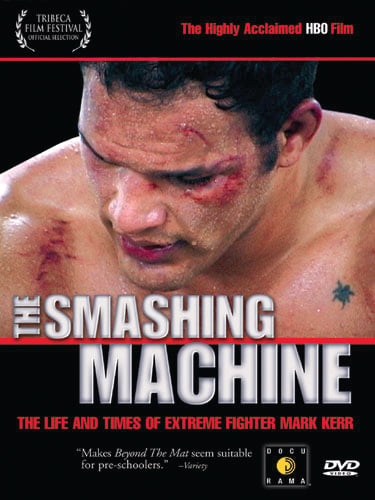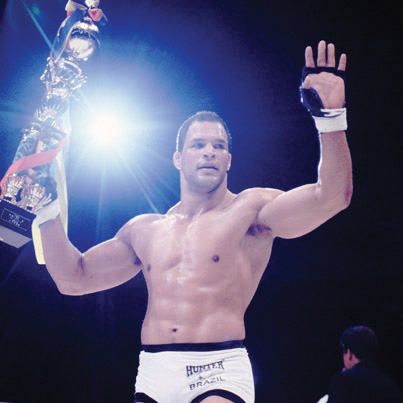
Issue 014
June 2010
Mark Kerr was one of the top MMA fighters of the late 1990s. Exploding onto the scene as a wrestler back in 1997, he cut a swathe through the brutal bare knuckle Vale Tudo rings of Brazil before winning back-to-back UFC tournaments, and enjoying a four-fight winning streak in PRIDE FC. A highly accomplished submission wrestler, he ruled the absolute division in the ADCC tournaments and was regarded as among the elite heavyweights in the world.
His downfall came in the most spectacular and public of ways. The well-known and critically acclaimed documentary The Smashing Machine saw Kerr near death following an overdose on painkillers. His decline was cemented with a bizarre self-inflicted knockout in a brief return to the ring in 2004, and Kerr faded from view.
A return to the limelight came recently, as he announced he had signed to fight Wes Sims on the new promotion ACF. Fighters Only correspondent Damon Martin spoke with Kerr following the signing, as Kerr let us in on the reasons for his return to the ring.
FO: How did this deal come about with the ACF?
MK: It’s a combination of things. I was in contact with their person in charge of fighter relations, and him and I started having conversations and they had a guy I was training named Hans Morrerro and Hans fought in the first show they had and I came up to see how the production was and the production was awesome. It was a great show. I got a chance to meet the owner and also people who were associated with the organization and I said ‘you know its been almost 9 years since I’ve fought on American soil’ and you know what it’s about time.

FO: “The Smashing Machine” documentary was a huge success with both MMA fans and the general public just interested in the story. How much did that movie affect your life?
MK: It was the first legitimate piece with that cross over from of being kind of a bar room brawl, fight club mentality that gave a real human element and emotion to a sport that a lot of people didn’t understand what it was about. People didn’t understand two guys fighting and then hugging at the end of it and how it feels. To emphasize the point at the HBO premiere, there was a woman close to 70 years of age who came up to me and we had a conversation and she was totally hooked. That change in demographic from the 20-something up to the 70-something people interested in the sport, I mean it really took on a life of its own. The whole movie, the whole process, everything I went through personally and then everything that went into producing that movie, I mean it stands alone.
FO: Did that film help you to focus on the future?
MK: It put a perspective on a lot of different things, but to this day the thing that has given me a better perspective is being a father. I have an 18-month-old son and those two things combined put things in perspective for me. (With MMA) At first it was just a way to make money and then it was fame, then it was fortune, it was a combination of different things, but year by year the focus has changed to where my life has lead to the birth of my son and my being a father and it sounds kind of corny to say but you know its true.
FO: You were one of the first transition fighters who focused on doing all aspects of the sport…You were a pioneer in the sport when it came to training for wrestling, submissions, boxing, etc. What do you attribute that to?
MK: Well first I think it’s a compliment and second I paid my dividends. In my second year of fighting I was in a room with some of the very best out there. The room consisted of me, Marco Ruas, Bas Rutten, Pedro Rizzo and Oleg Taktarov and those were my training partners and any given day you went in there and you weren’t ready to train you got your ass handed to you. It kind of forced you to evolve, because if you didn’t evolve every single day you got an ass whooping. You have to pay your dividends and it helped me to transition to where I’m at now. I wouldn’t call myself a pioneer, I’d call myself a catalyst. Bruce Lee had it right. You have to take parts of everything to make one thing.
FO: Another fighter who was focused on in the documentary was Mark Coleman. How is your relationship with him these days?
MK: Mark and I talk every now and again. I don’t talk to him as regularly as we used to. He’s the father of two beautiful girls and that helped him like it helped me to put things into perspective as it has helped me, and I know more than anything else that Mark is a competitor. If you lock Mark Coleman in a room with any other person, I’d put money on the fact that Mark is walking out. If you lock me and him in the room I don’t think either one are walking out.
FO: How about Bas Rutten? He had nothing but good things to say about you during the documentary. Do you stay in contact with him now and have any interest in training with him again?
MK: I’ve been trying to get Bas to come out to this fight actually to help me train and if nothing else to have him as a spectator or as a commentator. You know he’s just so busy with things, I mean he’s commentating on like 2 or 3 shows, he’s doing a book, he’s a father as well, he’s been trying his hand at Hollywood, he’s a very busy guy. Back then when I was training with him, he had a lot more free time so he was able to take the time and train with me. I personally have never seen a mixed martial artist with better hands than Bas. He can kick and punch faster than the wind can blow. It’s literally an experience worth having.
FO: After the documentary debuted, you had a fight in PRIDE that ended in controversy with you basically knocking yourself out during a takedown. What happened?
MK: You can look at the last two years of my fighting as a strange turn of events. After what happened with the documentary, I felt such a drive to redeem myself. And what’s not shown in the documentary is between me beating Enson and losing to Fujita, I won the absolute all-around in Abu Dhabi and did submission wrestling and there were just a lot of things that were going on behind the scenes, and just everything else going on as well. I mean my wife she just didn’t support me fighting, she knew that it brought me to a place where I could potentially self destruct. I think that is kind of one of those things that in retrospect where you just have to walk that line without falling over, because it takes everything out of you. Whether you win or lose you reap the emotional repercussions of it and so I never really caught up with it, and it caught up with me. Otherwise known as you burnout.

FO: Was there any discussion of you going back to PRIDE after that fight happened?
MK: I just never called PRIDE back. I just left it as is. There was just a sour note between PRIDE and myself. When you start working with a company like that in Japan you are bound to them. They introduced me to the fans in Japan, the Japanese market, and they made me their superstar in Japan. But basically with that fight, right before I went to Japan I was in a car accident and this is not an excuse but I had PCS (post concussion syndrome) and basically it would have only taken a slight tap on the head and I would have passed out and so that’s sort of a post script to what you saw happen in that fight.
FO: With the success of the UFC would you ever go back there?
MK: I made a promise to the promoters here at the ACF that any decisions I made domestically here in the U.S. I would talk with them first. They really, really hit a homerun with their first show and as a fighter and as a fan they really just did a great job as far as the production, the venue and everything and they just did a great job and it made it interesting enough for me to say I want to be part of this. I believe within a few years they will be able to sell out big arenas, they will be able to generate more fans and not only in the state of Colorado, I mean nationwide. I think the promoters have a feel for what the fans want to see. I’ve been in contracts with the UFC and if they are any version of the old contracts, they just are not viable at least for me anymore.
FO: What do you think about Wes Sims as an opponent? What danger does he present?
MK: Height. He’s 6’9” and its more difficult for me to fight guys who are taller because I’m 6’1” and I’m not the imposing 260lb guy I used to be I’m about 225lbs now. The thing that I have in my favour is experience and the one thing that Wes doesn’t have is as much experience. Where I’m at with 25 or 30 fights, and that’s not to take anything away from him because he’s been working at this for 5 or 6 years now. He poses just as much threat as any fighter, and I don’t take any fighter lightly because the consequences of taking any fighter lightly you get your ass kicked.
FO: Why the dramatic weight loss?
MK: It was in part personal and in part situational. I just got a divorce and I spent 9 months with attorneys and courtrooms, getting my parental rights and all this other stuff and a lot of it was stress and also its hard to weigh 260lbs, it’s a constant thing working to train to stay there. This is an opportunity at the ACF to shed, not to forget, but to shed the image of the Smashing Machine and to create a new image. The new moniker for me is ‘The One, The Only, The Original’.
FO: A win in this fight and a new start in the ACF, are you out to rebuild the name of Mark Kerr?
MK: It is also about improving upon what’s already there. That’s the simplest way to say it. There is no way in the world I could duplicate the Smashing Machine, that’s why I have to start something new. It is just my goal to improve upon what’s there and make it better.










